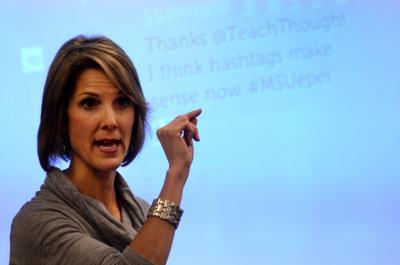University scholars don't use social media to circulate scientific findings and engage their tech-savvy students, according to Michigan State University scholars.
Social media is widely used in fields such as journalism and business – not just to push a product but also to engage in open dialogue with readers and clients – but has failed to take hold in academia's so-called ivory tower, even though the taxpayers who fund the research and want increased access to it clamor for insight and context from the experts.
Calls for open access aren't going to be heard if academics don't have interest in being open.
Some faculty members do share their work through social media and the authors make a rather bizarre proposal to increase it - adopt policies for promotion and tenure that reward these practices. Obviously we should not be funding and promoting scientists who are best at social media. Instead, it might be a self-correcting problem - people who engage more with other scientists should get more citations if their work is solid.

Christine Greenhow. Credit: Michigan State University
"Only a minority of university researchers are using free and widely available social media to get their results and published insights out and into the hands of the public, even though the mission of public universities is to create knowledge that makes a difference in people's lives," said co-author Christine Greenhow, assistant professor in MSU's College of Education. "Simply put, there's not much tweeting from the ivory tower."
In a survey of 1,600 researchers, they found that only 15 percent use Twitter, 28 percent use YouTube and 39 percent use Facebook for professional purposes. Those who do mainly use social media to find collaborators and disseminate their work and the work of others; they do not use it largely in their teaching of students.
The public should be relieved that taxpayer-funded scientists are doing science rather than messing around on Twitter but the scholars disagree.
"Academia is not serving as a model of social media use or preparing future faculty to do this," Greenhow said and believes that the issue is at the heart of larger discussions regarding accessibility, equal rights to higher education, transparency and accountability.
So if you care about civil rights, scientists, Tweet about fruit flies.
Citation: Christine Greenhow and Benjamin Gleason, 'Social scholarship: Reconsidering scholarly practices in the age of social media', British Journal of Educational Technology, 19 Mar 2014, DOI: 10.1111/bjet.12150






Comments